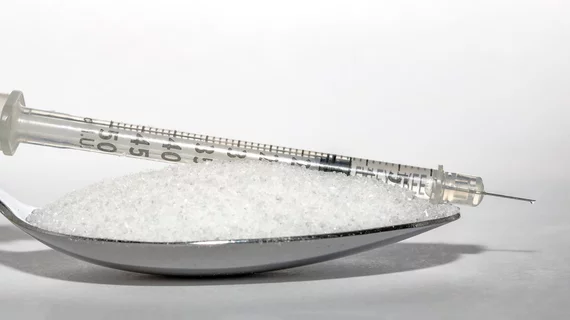Many Americans who can’t afford prescription insulin for their diabetes are turning to unregulated, illegal markets for discounted products, researchers reported in JAMA Internal Medicine this month.
It’s no secret that, in 2020, U.S. citizens are dying because they can’t afford insulin. The average list price for a single vial of the drug is around $250, and most patients use two to four vials a month, meaning it could cost them upwards of $1,000 every 30 days or $12,000 a year. Lantus, one of the most common insulin injections, costs on average 558% more in the U.S. than the rest of the world.
The crisis has forced some drug companies to lower their prices—Eli Lilly introduced a half-price insulin product last spring that, while lower-cost, has been hard for diabetics to obtain—and forced some patients to seek alternate solutions for diabetes control. Last June, around a dozen Americans piled into a caravan for an 817-mile journey to Canada, where the sticker price for a vial of insulin is just $30.
First author Akran Ahamed and colleagues’ study scrutinized public ads for three potentially life-saving medications—insulin, albuterol and epinephrine (EpiPen)—on Craigslist. The unregulated sale and purchase of prescription drugs is prohibited by both federal law and Craigslist policy, but during a 12-day study period in June 2019 Ahamed et al. identified hundreds of ads for both insulin and albuterol.
Insulin was by far the most popular medicine of the pair, accounting for 327 of 432 ads across 31 states. Around a quarter of advertisements—105—were for albuterol, but the team didn’t find any ads for EpiPens, which can retail for well over $700.
Analog insulin was the most commonly advertised insulin product on Craigslist, making up 71.9% of insulin ads. Of the analog insulins for sale in June 2019, the most popular were Lantus (27.8%), Humalog (27.5%) and Novolog (21.4%). Ahamed and co-authors compared average Craiglist prices for each drug with retail prices listed on Drugs.com and found that analog and human synthetic insulin were $372.30 and $123.19 cheaper per vial, respectively, on the online marketplace. On the other hand, an albuterol inhaler would cost a Craigslist buyer $18.77 more than if they picked up the drug at their pharmacy.
The team said that sellers typically seemed altruistically motivated to put their extra insulin up for sale, including lines like “I just wanted to help a diabetic out” and “I am willing to sell at a loss, hate to see it go to waste” in their ads. Others were trying to sell for financial reasons—one person said the supplies were from their recently deceased family member and they were selling “to put towards her funeral costs.”
Still, Ahamed et al. wrote, “the content of many advertisements raised safety concerns about the quality and safety of the medications being sold.” Not all insulin was unopened, and it’s safe to assume it wasn’t all shipped in medical-grade packaging.
“We found that analog insulins were the most commonly advertised prescription drugs and were being offered at a fraction of their retail price on Craigslist,” Ahamed and co-authors wrote. “Unregulated resale of prescription medications is illegal and, in the case of insulin, may be dangerous because improper storage can lead to loss of potency or contamination of the product.”
They said it was impossible to determine whether the ads resulted in any sales of prescription meds, but their study was still revealing.
“This study provides evidence that patients are seeking and likely finding medication, in particular analog insulin, in unregulated and unmonitored online marketplaces,” the authors wrote.

